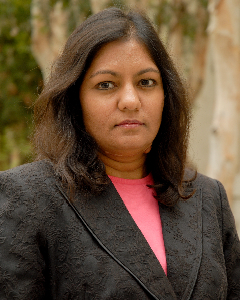
Meet the Faculty: Dr. Charu Sinha Operations Leader for AT&T-Time Warner Turned Business School Administrator and Professor
February 19, 2019
At the Argyros School of Business and Economics, Dr. Charu Sinha has served in two administrative capacities, first as Director of Continuous Improvement managing the School’s Assurance of Learning process for accreditation and then as Assistant Dean of Undergraduate Programs, overseeing the undergraduate academic programs and the academic progress of approximately 1,800 Argyros School undergraduate students. Her courses include Business Statistics, Business Analytics and Operations Management at both the graduate and undergraduate levels. Dr. Sinha’s research interests include stochastic modeling and optimization of production and service systems as well as pedagogical issues.
 Prior to joining Chapman University, Dr. Sinha worked for 10 years at AT&T as a Distinguished Member of Technical Staff, undertaking various roles on a series of pioneering initiatives in voice, data, and voice-over-internet protocol. Her responsibilities included new service development, business planning, operations planning, and deployment of various business communication services. Dr. Sinha was previously a faculty member at the Weatherhead School of Management at Case Western Reserve University.
Prior to joining Chapman University, Dr. Sinha worked for 10 years at AT&T as a Distinguished Member of Technical Staff, undertaking various roles on a series of pioneering initiatives in voice, data, and voice-over-internet protocol. Her responsibilities included new service development, business planning, operations planning, and deployment of various business communication services. Dr. Sinha was previously a faculty member at the Weatherhead School of Management at Case Western Reserve University.
Q&A with Dr. Sinha
-
What research or publication are you most proud of authoring and why?
The paper that I published in 2016, “Optimality of the Fastest Available Server Policy”, in Queueing Systems. I first addressed the problem in my doctoral dissertation, but as I began working on a generalized model with my co-authors, we had to re-formulate the model and develop new results. Two decades after I first worked with the problem, including a detour into industry experience, I found that I still had the chops to work with the rigors of the problem and derive the new results.
-
What is the most important lesson you hope students walk away from your class(es) with?
In developing an understanding of any topic, the importance of truly comprehending the fundamentals cannot be over-stated. It is the ability to fully grasp the simplest building blocks that allows you to stack them together in various combinations to create magic down the road. My over-riding hope is that my students appreciate this fact so that it equips them to be life-long, independent learners in their own careers.
-
What makes your class different and/or Why should students take your class(es)?
In all my courses, I teach the quantitative content using a logical and intuitive approach to the underlying mathematics. I believe it is this attribute that allows students, even those who initially find the material as daunting, to comprehend it and find success. As an educator, there is nothing more gratifying than to see students learn what they previously believed was out of their realm of abilities.
-
What’s the accomplishment you’re most proud of in your career or what goal are you working toward?
If I had to identify the pinnacle (thus far) of my very eclectic career, I would call out two responsibilities. One, successfully leading the operations for the AT&T- Time Warner first ever commercial voice-over-broadband; this was history-making. Back in the early 2000s, VoIP was still at the level of an emerging service. The voice-over-internet applications were over telephone pipes that also carried internet data. In contrast, the voice-over-broadband initiative allowed voice to be carried over cable pipes. This shift was the precursor to all the bundling that we see today, with voice, internet, TV over cable (or broadband) pipes. In this role, I was part of a huge technological evolution of communication services. This was the first step in enabling enough data for video-streaming and gaming to be supported today.
Second, my tenure as Assistant Dean of Undergraduate Programs and the interactions I had with 1000s of students (that is not a typo!) has forever changed how I relate to and understand my students. I consider this invaluable.